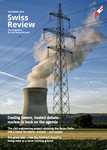Who is a serious politician? Which candidates hold views in line with my own? Which party represents my beliefs in Parliament? Who has adopted which political position over recent years? What should I pay attention to when completing the ballot paper? These are just a few of the questions that voters have to consider when they at some point fill in their ballot paper to determine who will make up Switzerland’s future government. For the Swiss Abroad, who cannot follow the election campaign close-up, it is particularly difficult to obtain information. The websites presented here will certainly be useful.
www.smartvote.ch | Which is the right candidate for me?
Do you want to find out which National Council and Council of States candidates hold similar views to your own on old-age pension, the right to vote for foreigners, tax competition or the free movement of persons? The electronic voting aid Smartvote compares your political values with those of the candidates and produces an individual voting recommendation. You simply have to complete a multiple-choice questionnaire with the option of 75 (deluxe) or 32 (rapid) questions and you will soon discover who concurs with your political views and to precisely what extent.
But that’s not all Smartvote has to offer, as a comprehensive profile of each candidate can also be viewed. This contains details on education, career, hobbies and vested interests. The so-called Smartspider, which graphically depicts the views of the candidates on pairs of opposites, such as “open foreign policy” and “restrictive immigration policy”, is also an interesting feature. Your own profile then appears over that of the candidate in the Spider. The whole initiative is run very seriously by an independent network of political scientists but definitely also has a fun side. And it sometimes produces astonishing results. However, for the 2015 elections all of this is only available from the beginning of August.
Smartvote has existed since 2003 and is provided by the not-for-profit association Politools. An interdisciplinary network of academics, which is supported by the well-known political scientists Andreas Ladner and Michael Hermann amongst others, is behind the initiative. Over recent years, the website has become one of the most visited political sites on the internet. Ever more cantonal and local elections are also being covered by Smartvote. Above all, it is the voting aid’s partnership with various media organisations that has made it so successful. Leading newspapers use the Smartspiders for their candidate profiles or link their websites to Smartvote. The Organisation of the Swiss Abroad (OSA) also has a direct link to Smartvote.
Smartvote is also heavily financed by media partnerships. However, the candidates make a contribution too. This has sparked criticism on several occasions. In the city of Berne, for example, the Swiss Social Democratic Party (SP) expressed concern that the site’s independence was jeopardised and suggested that federal government should make a financial contribution.
Another issue with Smartvote is that not all candidates ever take part. Anyone who does not answer the questions or does not complete their profile is not taken into account at all in the voting recommendation. The significance of the profiles should not be overestimated either. What the candidates tick and how they ultimately vote in the Federal Palace is sometimes not the same. However, according to Politools President Daniel Schwarz, random testing indicates that the Smartvote profiles concurred with the actual voting behaviour of the politicians in over 80% of cases.
Address: www.smartvote.ch; Languages: German, French, Italian and English; Scope: 1.2 million voting recommendations were produced in 2011; Operator: not-for-profit organisation “Politools – Political Research Network”; Characteristics: compares political views of users with candidates and produces individual voting recommendations, 2015 election online from early August
www.ch.ch | Federal government’s virtual information counter
The website www.ch.ch has set itself ambitious targets: The website is aiming to become a kind of electronic “blueprint” for contact between citizens and the authorities. Federal government and the cantons cooperated on this initiative back in 2006. Their e-government strategy pays particular attention to the Swiss Abroad. The website now attracts almost six million visitors a year and has become one of federal government’s most important information channels.
For the forthcoming federal elections, the Federal Chancellery has clearly set out all official information and made it available in five languages at www.ch.ch/en/elections2015. Based on the latest Windows operating system, it is presented using the modern tile design. The administration has also sought to ensure public accessibility in terms of content and has based the structure on possible user questions and produced clear and comprehensible texts. Some of the content is also available on Facebook, Twitter and YouTube, and Parliament is explained to the hard of hearing in a video using sign language.
Information on the electoral procedure, candidature requirements, deadlines to be met or applicable legal provisions can quickly be found on the website. The political parties and the party system are also outlined in an impartial way. A voting glossary and answers to frequently asked questions make the Swiss voting system more accessible to visitors less well acquainted with politics. A special “tile” is dedicated to the Swiss Abroad wishing to stand for election or vote. The Federal Chancellery has pledged to constantly extend and update the content and to provide information on the voting documents, the competent authorities, on registration as an eligible Swiss voter abroad, on the right to a postal vote and e-voting.
The supplementary content provided by the Federal Chancellery is also interesting and useful. It constantly compiles the latest press releases of federal government and the cantons on the elections or corresponding reports released by the Swiss News Agency (SDA). There is also an historical review to mark the anniversary of the National Council elections. This explains, for example, why the larger chamber is being elected for the 50th time this year despite the fact that only 167 years have passed since the foundation of the modern federal state. The reason is relatively straightforward albeit little known today. The legislative period has been four years since 1931, before which it only lasted three years and at one time it was just two years.
On election day itself and over the subsequent weeks, the results will be published at www.ch.ch/en/elections2015on an ongoing basis and enhanced with analyses and statistics thanks to cooperation with the Federal Statistical Office and the Political Rights section.
Address: www.ch.ch/en/elections2015; Languages: German, French, Italian, Romansh and English; Scope: no joint site existed at the time of the last elections at federal level; Operator: Federal Chancellery; Characteristics: clearly presented information from federal government on the 2015 elections
Easyvote | By young people for young people
Voting at referenda and elections is not that straightforward, particularly for young people new to politics. Easyvote, a project organised by the umbrella organisation of the Swiss Youth Parliaments, aims to increase political participation amongst 18 to 25-year-olds. It provides impartial assistance with voting at national and cantonal referenda and elections. This is based on the official information of federal government but is presented in a simpler and more easily comprehensible way. The entire project is run on a voluntary basis by 120 young people aged 15 to 30 from throughout Switzerland.
Easyvote is planning an extensive information campaign for the 2015 national elections. The main objective is to overcome the notion that the process is excessively demanding. Through various initiatives, it is seeking to eliminate young people’s dread of the complicated voting system. The entire procedure is to be simplified to the extent that it can be clearly set out on a business card and distributed to the target audience. In cooperation with Smartvote, short profiles of candidates and the (youth) parties are to be supplemented with topics relevant to young people. In a similar way to Smartvote, Easyvote users can receive a voting recommendation, and the questions that have to be answered are also produced in a way that is aimed at young people. Furthermore, practically the entire content can, of course, also be shared, commented upon and evaluated via social media.
Address: www.easyvote.ch; Languages: German, French and Italian; Scope: 30,000 users at the 2011 elections, 270 communes and institutions have subscribed to the voting aid; Operator: umbrella organisation of the Swiss Youth Parliaments; Characteristics: easily understandable information on elections and referenda, online from mid-August for 2015 elections
I want to vote | Listening instead of reading
Anyone who has difficulty reading or simply prefers audio is well served by the website www.ich-will-waehlen.ch. Well-known TV presenters, such as Susanne Kunz (German), Flavio Dal Molin (French) and Pietro Bernaschina (Italian), present the information on the voting system. Site users do not have to watch long videos but can instead click directly on a topic to immediately obtain the required information. It explains how to vote, why we vote and how Parliament works. The special characteristics of the individual cantons with regard to the voting system are also explored. However, it does not contain information on the voting procedure for the Swiss Abroad.
Address: www.ich-will-waehlen.ch; Languages: German, French and Italian; Scope: 40,000 people visited the site in 2011; Operator: Swiss Federation for Adult Learning (SVEB); Characteristics: information on the 2015 elections explained by presenters, online from April
List of links:
www.parteienkompass.ch A collaborative initiative between hep-Verlag, Smartvote and the Pädagogische Hochschule Bern. It provides party profiles, political science learning modules and the positioning of visitors’ own political views in the Swiss party political landscape. Only in German.
www.civicampus.ch An interactive political science site available in the four national languages produced through cooperation between Parliamentary Services and the Fuchs publishing house. You can also review what you have learned immediately using questionnaires.
www.wahlen.ch Information site in German on the voting process by the private communications agency bfk Mediendienste. At the last two federal elections it attracted several million visitors thanks to media partnerships. It produces personal video interviews for candidates.
www.vimentis.ch The politically neutral trilingual information site about Swiss politics is essentially run by students from the University of St. Gallen on a voluntary basis. The annual survey on current political issues attracts great attention. However, it is almost exclusively conservative politicians who are represented in the blogs.











Comments
Comments :
What would be desirable is for all citizens to be able to get the material in electronic format. But since the material includes the secured key for the voting, the material would have to be obtained through a secured access.
Technically this is doable, but the will does not seem to be there, so lots of reasons are invoked to stress the risks of abuse, ignoring the fact that the risk of abuse is much bigger by ordinary mail.
Thanks,
HSR
In one of the next issue of "Swiss Revue" you will also find all information.